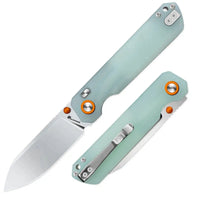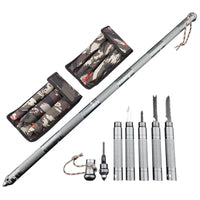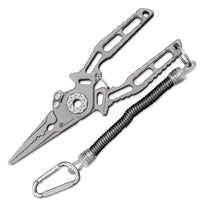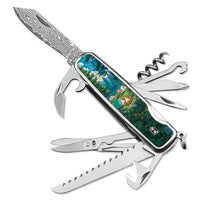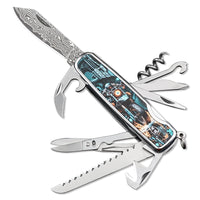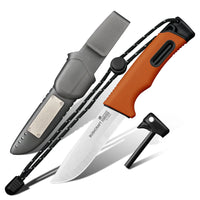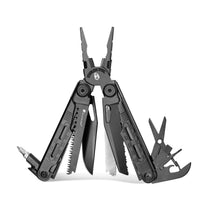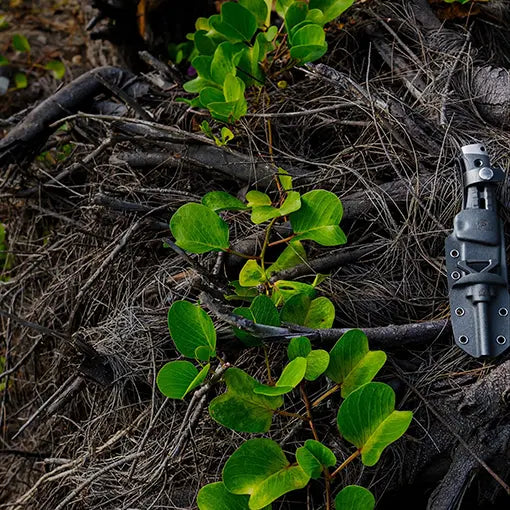Premium 14C28N Blade · Latest Button Lock · Improved Design
Now $35.99 (Was $49.99)

Does Stainless Steel Rust? A Guide to Maintaining Your Outdoor Surfaces
When considering materials for outdoor use, the question 'does stainless steel rust' often arises. While stainless steel is highly resistant to rust and corrosion, it's not entirely immune. Proper maintenance and understanding of its properties are key to preventing rust.
Understanding Stainless Steel and Its Resistance to Rust
Stainless steel is an alloy primarily composed of iron with a minimum of 10.5% chromium. This chromium reacts with oxygen to form a protective layer that prevents rust. However, certain conditions can compromise this layer.
What Makes Stainless Steel Resistant?
The chromium oxide layer acts as a barrier against moisture and oxygen, reducing the likelihood of rust formation. Grades like 304 and 316L offer varying levels of resistance, with 316L being more suitable for harsh environments due to added molybdenum.
Factors That Can Cause Rust
Exposure to chlorides, poor maintenance, mechanical damage, and improper storage can lead to rust. Understanding these factors is crucial for maintaining stainless steel surfaces.
Common Causes of Rust on Stainless Steel
Rust on stainless steel typically occurs under specific conditions. Recognizing these causes helps in taking preventive measures.
Chloride Exposure
Chlorides, especially from saltwater and chlorine, are highly corrosive. Coastal areas and swimming pools pose significant risks to stainless steel. Regular rinsing with fresh water can mitigate this issue.
Mechanical Damage
Scratches and dents can break the protective layer, exposing iron beneath. Using non-abrasive cleaning tools and avoiding rough handling minimizes such damage.
Preventing Rust on Stainless Steel
Taking proactive steps ensures the longevity of stainless steel surfaces. Here are some effective prevention strategies:
Regular Cleaning Practices
Clean stainless steel regularly using mild detergents and water. Avoid abrasive cleaners or steel wool. Rinse thoroughly after cleaning to remove residues.
Protective Coatings
Applying protective coatings, such as car wax or specialized protectants, adds an extra barrier against environmental elements. This is particularly useful in high-risk areas.
- Avoid chloride exposure by choosing alternative cleaning agents.
- Store stainless steel in dry conditions to prevent moisture buildup.
- Inspect surfaces regularly for signs of rust or damage.
Maintenance Tips for Outdoor Environments
Outdoor environments present unique challenges for stainless steel. Tailoring maintenance practices to these conditions enhances durability.
Coastal Areas
In coastal regions, marine-grade stainless steel is recommended. Regular rinsing with fresh water removes salt deposits, reducing corrosion risk.
Swimming Pools
For pool environments, select stainless steel grades with higher chloride resistance. Implement a routine cleaning schedule and apply protective coatings designed for such settings.
Conclusion: Keeping Your Stainless Steel Rust-Free
Maintaining stainless steel involves understanding its limitations and adopting appropriate care practices. By addressing potential causes of rust and implementing preventive measures, you can ensure your stainless steel products remain in excellent condition. Whether in coastal areas, swimming pools, or other challenging environments, proper maintenance extends the lifespan of your surfaces.
Remember, while stainless steel offers superior resistance to rust, it requires regular attention. Use the tips outlined here to protect your investment and enjoy its benefits for years to come.
Frequently Asked Questions (FAQ)
Here are answers to common questions about stainless steel rust:
Can Stainless Steel Rust?
Yes, stainless steel can rust under certain conditions. Factors like chloride exposure and mechanical damage compromise its protective layer.
Can 304 Stainless Steel Rust?
While 304 stainless steel is highly resistant, it can rust if exposed to harsh environments without proper maintenance.
Will Stainless Steel Corrode Over Time?
Without adequate care, stainless steel can corrode over time. Regular cleaning and protection are essential to prevent this.
- Use marine-grade stainless steel in coastal areas.
- Avoid abrasive cleaners and steel wool.
- Inspect surfaces regularly for early signs of rust.


